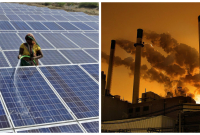A damning new report has blown the lid on Canada’s support for fossil fuel industries, totalling nearly $3 billion per year, flying in the face of a G20 pledge to phase such subsidies out six years ago.
In 2013-14, federal support for fossil fuels under the previous Stephen Harper government amounted to at least $1.7 billion. A further $1.3 billion in provincial subsidies was kicked into the industry, according to a Nov. 12 report titled Empty Promises: G20 Subsidies to Oil, Gas and Coal Production co-published by the Overseas Development Institute and Oil Change International.
“Why is it time to phase out subsidies to last century’s high-carbon energy? Because, as Prime Minister Trudeau said last week, it’s 2015,” said Alex Doukas of Oil Change International.
The Liberal Party of Canada’s election platform pledged that a Liberal government would “fulfill Canada’s G20 commitment to phase out subsidies for the fossil fuel industry.” The Liberals have also promised to set national targets to cut greenhouse gas emissions, but has also promised provinces they will be able to roll out their own emissions-reductions programs.
In addition, the Liberals have promised to invest $20 billion over 10 years on greener infrastructure, as well as issue "green bonds" to fund environmentally friendly energy projects.
But Canada's ongoing support for fossil fuel companies comes despite a worldwide drive to keep three quarters of current carbon-based energy reserves in the ground.
What’s more, the fossil fuel sector is facing declining returns in coal and new hard-to-reach oil and gas reserves, while a growing movement by churches, universities and other organizations has succeeded in divesting millions of dollars from oil and gas companies.
"This is a unique opportunity for the new Canadian government to hit the ground running at the G20, live up to election promises and push other G20 leaders to phase out subsidies as they first committed to doing six long years ago. Axing $1.7 billion in [federal] handouts to fossil fuel producers is a critical step that Canada needs to take towards tackling climate change, and it would be very welcome in the lead-up to major climate talks in Paris next month," said Doukas.
However, Canada is not alone in ignoring its pledge. The report revealed that G20 nations are supporting fossil fuel to the combined tune of US$452 billion. This annual total includes $78 billion in national subsidies from governments to fossil fuel companies, another $286 billion invested by state-owned enterprises in G20 nations and a further $88 billion in public financing in 2013-14.
All told, fossil fuels enjoy total global subsidies of US$5.3 trillion a year — or $10 million per minute — according to a May 2015 working paper published by the International Monetary Fund.
This huge sum dwarfs the relatively tiny $121 billion in annual global subsidies invested into renewable energy development by the world's governments.
Japan: the biggest investor in fossil fuels
The single biggest investor in fossil fuels is Japan, whose government pumped in more public finance for fossil fuel production in 2013 and 2014 than any other G20 country, averaging US$19 billion per year. The Japanese total included US$2.8 billion in coal financing alone.
Meanwhile, G20 host Turkey is giving more tax breaks to support its program of building more new coal power plants than any other OECD country, potentially raising its own greenhouse gas emissions by 94 per cent over the next 15 years.
"G20 governments are paying fossil fuel producers to undermine their own policies on climate change. Scrapping these subsidies would rebalance energy markets and allow a level playing field for clean and efficient alternatives," said Shelagh Whitley at the Overseas Development Institute.
The report, published ahead of this month’s G20 summit in Antalya, Turkey, examines three types of G20 government support in 2013 and 2014 — the most recent years with comparable data. It looks at national subsidies extended through direct spending and tax breaks; investment by state-owned enterprises both domestically and internationally; and public finance extended through — for example — loans from government-owned banks and financial institutions.
"Continuing to fund the fossil fuel industry today is like accelerating towards a wall that we can clearly see. G20 leaders need to slow down and turn us around before we hit climate disaster," said Stephen Kretzmann, director of Oil Change International.
Renewing hope
However, fresh hope is on the horizon: countries attending the Paris climate talks scheduled just days after the G20 summit are committing to ramping up renewables investment and make deep cuts in greenhouse gas emissions, spelling trouble ahead for fossil fuel companies.
Already, Brazilian president Dilma Rousseff has pledged to slash emissions by 37 per cent on 2005 levels by 2025 and increase protection for its forests.
Her country joins India, whose government is rolling out a crash program to ramp up renewable energy production fivefold by 2020 and cut its emission intensity (amount of CO2 produced divided by GDP) by 25 per cent.
China is also set to roll out a national carbon cap-and-trade program, which will bring it into line with the U.S.’s recently announced Clean Power Plan to cut emissions 32 per cent by 2030.




Comments